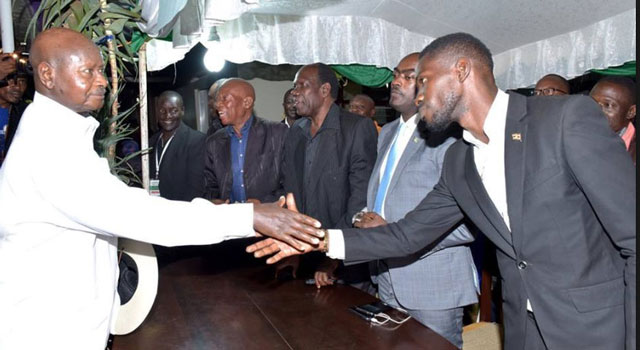
Why our democracy will not be strengthened by a violent contest but dialogue and compromise
THE LAST WORD | Andrew M. Mwenda | The current struggle between President Yoweri Museveni on the one hand and the two most popular opposition groups to wit Defiance led by Dr. Kizza Besigye, and People Power led by Robert Kyagulanyi aka Bobi Wine on the other, is over power not democracy or policy.
One side seeks to cling to power by all means and at all costs. The other side seeks to seize that power by all means and at all costs. In this struggle, moderate voices, which constitute a large majority, have been side-lined. Each of these sides has mobilised the most violent elements of our society for political action. On the NRM side is the use of those elements of the state specialising in violent crackdown on dissent including torture. On the side of Defiance and People Power, both Besigye and Bobi Wine have mobilised radical extremists with a penchant for violent riots, physical assault, and intimidation on the streets plus cyber bullying.
If left to the two sides, this struggle is bad for our country. At the very best it can produce an unstable stalemate that inflicts a huge toll on the ability of the government to govern. In the unlikely event the radical extremist opposition wins, it will lead to the replacement of the current semi democratic incompetent and corrupt government with another that is an intolerant tin pot dictatorship and even more corrupt and incompetent than the current one. The third likelihood is anarchy.
That is why it is critical to mobilise a large constituency of moderate voices to engage in politics to promote civility, moderation and compromise. There are hardly any examples in history when democracy was a product of a violent struggle. In almost all cases democracy has resulted from civil struggles that involved negotiations and compromise.
The use of violence; whether in the bush or on the streets only strengthens the power of those who specialise in violence. It also diminishes the power of those who believe in negotiation and compromise. Indeed a government that comes to power through violence will, when threatened, always resort to violence to govern. That is the fate of the NRM. A government that comes to power through negotiations and compromise will always tend to rule through negotiations and compromise.
Therefore, our pursuit of democracy must make us disavow radical extremism. We must support the forces of moderation and compromise. And we must remember that in all case where negotiations have paved the way to democracy, both sides have had to look at themselves as partners, not enemies – a perspective alien to the radical extremists. For this to happen moderates have to be sufficiently strong to be credible negotiating partners with the government. This is what happened in South Africa, Chile, South Korea, Poland, Czechoslovakia, etc. The current scenario where the initiative in the opposition is held by radical extremists is antithetical to democratisation.
There will always be elements in the opposition who reject talks. I learnt this from reading about democratic transitions elsewhere and from my own experience working with Conrad Nkutu to bring about talks between Museveni and Besigye in 2011. It became clear to me some people in opposition fear that negotiations will produce an undesirable compromise. This is because such people hope that continued struggle will produce regime collapse and their takeover and monopoly of power.
But notice that for such people the aim is power, less so democracy or alternative policies. It is evidenced in Besigye’s everlasting efforts to win the presidency as the sole objective. It is also evidenced by Bobi Wine’s comment that his aim is to remove Museveni from “that comfortable chair” – perhaps so that Bobi Wine can sit in it. While they use democracy and freedom as rallying cries, the actions of both Besigye and Bobi Wine demonstrate that they pay only lip service to these ideals.
Luckily for Uganda, we have an institutional framework for dialogue, the Inter Party Organisation for Dialogue (IPOD). It brings together the leaders of political parties represented in parliament to discuss such things as electoral reform. For some years now, all the parties have not given it serious attention. In the last two public appearances on television that Museveni made, he has talked about it. Now is the time to make IPOD meaningful. Only then will radical extremism be side-lined.
For dialogue to be successful each side has to concede some degree of legitimacy to the other. The opposition has to recognise government as a legitimate partner in the reform effort and actually acquiesce in its right to govern. The government on its side has to accept the opposition as a legitimate representative of significant segments of the population. In the aforementioned effort by me and Nkutu this became a sticking issue. While Museveni accepted all the conditions set by Besigye, the latter refused to accept the legitimacy of the government.
In engaging in dialogue and making compromises it is inevitable either side will be accused of selling out. This is especially so for the opposition in a country where the incumbent has a reputation for buying off opposition leaders. The reality is that democratisation is only possible when leaders on both sides and most especially in the opposition are willing to annoy their supporters and even betray the interests of their followers in order to achieve concessions from the government.
Therefore, democratising Uganda; as opposed to fighting for power, will require a leadership of the opposition that is both moderate and courageous. Moderate in that it uses a language that makes the government side see them as partners to work with rather than enemies to fight. Courageous in the sense that it must be willing to anger its radical base, even betray their expectations, in order to meaningfully gain democratic concessions from the government. This means the leadership of the opposition triangulates the political space by standing above and between the two extreme groups hence consolidating the middle where the majority of Ugandans actually stand.
I am aware that this is even more difficult today in the age of social media which tends to amplify the voice of the most virulent and radical groups. Indeed, to be heard today via the medium called social media, one has to be radical. But then the challenge in trying to bolster the moderate forces while depending on social media for mass mobilisation is how to present a moderate position in a radical way. That is the nut to crack.
****
amwenda@independent.co.ug
 The Independent Uganda: You get the Truth we Pay the Price
The Independent Uganda: You get the Truth we Pay the Price


